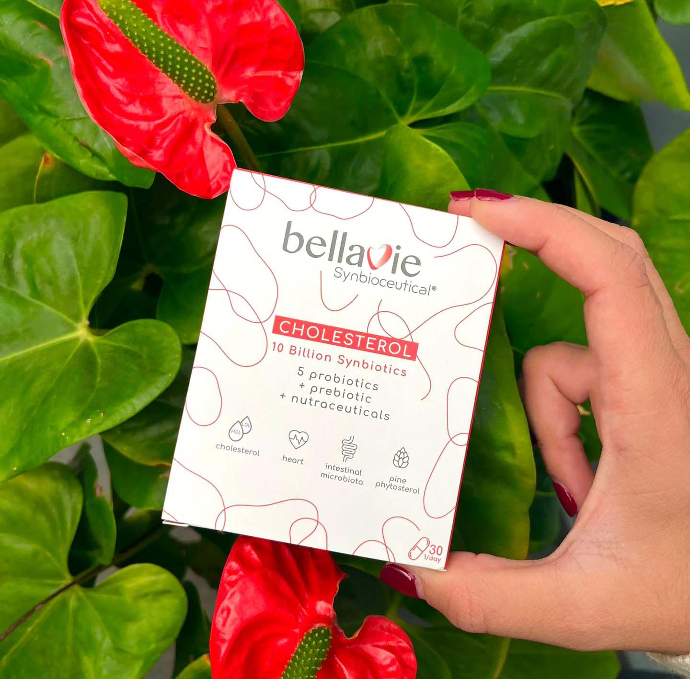What is cholesterol ?
Cholesterol is a fatty substance that is naturally produced by the liver and is also found in some foods of animal origin. Cholesterol is essential for the production of certain hormones, the digestion of fats and the construction of cell membranes. There are two types of cholesterol: LDL (or 'bad') cholesterol and HDL (or 'good') cholesterol. LDL-cholesterol is associated with the build-up of plaque in the arteries, which can increase the risk of cardiovascular disease, while HDL-cholesterol helps remove excess cholesterol from the blood.
High levels of LDL cholesterol in the blood can be caused by poor diet, lack of exercise, obesity and other risk factors for cardiovascular disease. It is important to maintain healthy cholesterol levels by adopting a healthy lifestyle, including a balanced and varied diet, regular physical activity and avoiding tobacco and alcohol.
Our BellaVie CHOLESTEROL
BellaVie CHOLESTEROL is a high CFU*, broad-spectrum dietary supplement containing 5 microbiotic strains, fibre and nutraceuticals, each selected for their health benefits. The formula has been developed with essential gut bacteria to promote a more favourable balance of the gut microbiota.
The formula is supplemented with fibre and nutraceuticals that work in synergy with the microbiotic sources and enhance their activity.
BellaVie CHOLESTEROL capsules contain pine phytosterol extract which helps maintain normal cholesterol levels**.
* : Colony Formation Unit
** : The beneficial effects are obtained from a daily consumption of minimum 0.8g.

The benefits of BellaVie CHOLESTEROL :
- 100% Belgian production;
- Live strains: All our formulas have been developed with probiotic strains, which are living bacteria;
- Innovative formula and patented Synbioceutical concept: the formula has been developed for specific uses. The product contains microbiotic strains, fibers and nutraceuticals well described scientifically for specific health benefits;
- Broad spectrum: CFU = Colony Forming Units which allows to estimate the number of viable bacteria in a sample;
- High concentration: each capsule contains a large amount of live microorganisms. The quantity is indicated in CFU (Colony Forming Units). Each capsule contains 10.000.000.000 UFC;
- Vegetable capsules and Halal certification: the capsules are certified vegan, non-GMO, Halal and Kosher;
- Gastro-resistant capsules: to protect the microbiotic strains from the acidity of the stomach, we use specific capsules with a superior resistance to this acidity. The quantity of living microbiotic strains in the intestine will therefore be higher;
- Specific nutraceuticals: the nutraceuticals are chosen according to the desired action;
- Heat resistant strains: Bacillus Coagulans is a world-renowned strain that provides optimal temperature resistance up to zone 4B. This zone indicates a very humid and intense climate;
- Moisture resistant packaging: our packaging (capsule and blister) with low moisture content has been selected to preserve the microbiotic strains against moisture and allow them to live longer.
Food that help reduce cholesterol levels

Vegetables: they contain soluble fibre, which can reduce blood cholesterol levels. Green vegetables are particularly rich in soluble fibre.
Fruit: such as apples, oranges, bananas, strawberries and blueberries can help reduce cholesterol levels.
Legumes: such as lentils, chickpeas and beans are rich in soluble fibre and vegetable protein, which can help reduce blood cholesterol levels.
Nuts: almonds, cashews, hazelnuts and pistachios are particularly rich in unsaturated fats and help lower blood cholesterol
Oily fish: such as salmon, tuna, mackerel are rich in omega-3 fatty acids, and can help reduce cholesterol levels.
In addition to the food...

It is important to note that cholesterol reduction does not only depend on diet, but also on other factors such as exercise, smoking, weight and genetics.